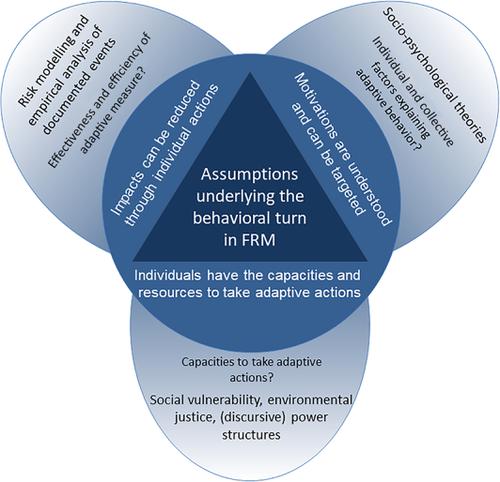当前位置:
X-MOL 学术
›
WIREs Water
›
论文详情
Our official English website, www.x-mol.net, welcomes your
feedback! (Note: you will need to create a separate account there.)
The behavioral turn in flood risk management, its assumptions and potential implications
WIREs Water ( IF 6.8 ) Pub Date : 2020-03-09 , DOI: 10.1002/wat2.1418 Christian Kuhlicke 1, 2 , Sebastian Seebauer 3 , Paul Hudson 2 , Chloe Begg 1 , Philip Bubeck 2 , Cordula Dittmer 4 , Torsten Grothmann 5 , Anna Heidenreich 2 , Heidi Kreibich 6 , Daniel F. Lorenz 4 , Torsten Masson 7 , Jessica Reiter 4 , Thomas Thaler 8 , Annegret H. Thieken 2 , Sebastian Bamberg 9
WIREs Water ( IF 6.8 ) Pub Date : 2020-03-09 , DOI: 10.1002/wat2.1418 Christian Kuhlicke 1, 2 , Sebastian Seebauer 3 , Paul Hudson 2 , Chloe Begg 1 , Philip Bubeck 2 , Cordula Dittmer 4 , Torsten Grothmann 5 , Anna Heidenreich 2 , Heidi Kreibich 6 , Daniel F. Lorenz 4 , Torsten Masson 7 , Jessica Reiter 4 , Thomas Thaler 8 , Annegret H. Thieken 2 , Sebastian Bamberg 9
Affiliation

|
Recent policy changes highlight the need for citizens to take adaptive actions to reduce flood‐related impacts. Here, we argue that these changes represent a wider behavioral turn in flood risk management (FRM). The behavioral turn is based on three fundamental assumptions: first, that the motivations of citizens to take adaptive actions can be well understood so that these motivations can be targeted in the practice of FRM; second, that private adaptive measures and actions are effective in reducing flood risk; and third, that individuals have the capacities to implement such measures. We assess the extent to which the assumptions can be supported by empirical evidence. We do this by engaging with three intellectual catchments. We turn to research by psychologists and other behavioral scientists which focus on the sociopsychological factors which influence individual motivations (Assumption 1). We engage with economists, engineers, and quantitative risk analysts who explore the extent to which individuals can reduce flood related impacts by quantifying the effectiveness and efficiency of household‐level adaptive measures (Assumption 2). We converse with human geographers and sociologists who explore the types of capacities households require to adapt to and cope with threatening events (Assumption 3). We believe that an investigation of the behavioral turn is important because if the outlined assumptions do not hold, there is a risk of creating and strengthening inequalities in FRM. Therefore, we outline the current intellectual and empirical knowledge as well as future research needs. Generally, we argue that more collaboration across intellectual catchments is needed, that future research should be more theoretically grounded and become methodologically more rigorous and at the same time focus more explicitly on the normative underpinnings of the behavioral turn.
中文翻译:

洪水风险管理的行为转向,其假设和潜在影响
最近的政策变化突显了公民需要采取适应性行动以减少与洪水相关的影响。在这里,我们认为这些变化代表了洪水风险管理(FRM)的行为转变。行为转向基于三个基本假设:首先,可以很好地理解公民采取适应性行动的动机,从而可以将这些动机作为FRM实践的目标。第二,私人的适应性措施和行动可有效降低洪水风险;第三,个人有能力执行此类措施。我们评估了经验证据可以支持假设的程度。我们通过与三个知识流域接触来做到这一点。我们转向心理学家和其他行为科学家的研究,这些研究的重点是影响个人动机的社会心理学因素(假设1)。我们与经济学家,工程师和定量风险分析人员合作,他们通过量化家庭层面适应性措施的有效性和效率来探索个人可以在多大程度上减少与洪水相关的影响(假设2)。我们与人类地理学家和社会学家交谈,他们探讨了家庭适应和应对威胁性事件所需的能力类型(假设3)。我们认为,对行为转向进行调查非常重要,因为如果不遵循概述的假设,则存在造成和加强FRM不平等的风险。因此,我们概述了当前的知识和经验知识以及未来的研究需求。通常,我们认为需要在知识流域进行更多的合作,未来的研究应该在理论上更基础,在方法上更加严格,同时更明确地关注行为转向的规范基础。
更新日期:2020-03-09
中文翻译:

洪水风险管理的行为转向,其假设和潜在影响
最近的政策变化突显了公民需要采取适应性行动以减少与洪水相关的影响。在这里,我们认为这些变化代表了洪水风险管理(FRM)的行为转变。行为转向基于三个基本假设:首先,可以很好地理解公民采取适应性行动的动机,从而可以将这些动机作为FRM实践的目标。第二,私人的适应性措施和行动可有效降低洪水风险;第三,个人有能力执行此类措施。我们评估了经验证据可以支持假设的程度。我们通过与三个知识流域接触来做到这一点。我们转向心理学家和其他行为科学家的研究,这些研究的重点是影响个人动机的社会心理学因素(假设1)。我们与经济学家,工程师和定量风险分析人员合作,他们通过量化家庭层面适应性措施的有效性和效率来探索个人可以在多大程度上减少与洪水相关的影响(假设2)。我们与人类地理学家和社会学家交谈,他们探讨了家庭适应和应对威胁性事件所需的能力类型(假设3)。我们认为,对行为转向进行调查非常重要,因为如果不遵循概述的假设,则存在造成和加强FRM不平等的风险。因此,我们概述了当前的知识和经验知识以及未来的研究需求。通常,我们认为需要在知识流域进行更多的合作,未来的研究应该在理论上更基础,在方法上更加严格,同时更明确地关注行为转向的规范基础。











































 京公网安备 11010802027423号
京公网安备 11010802027423号